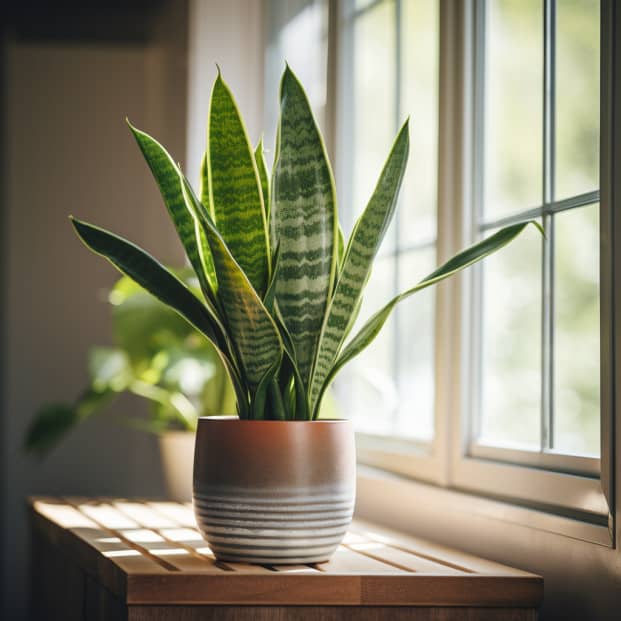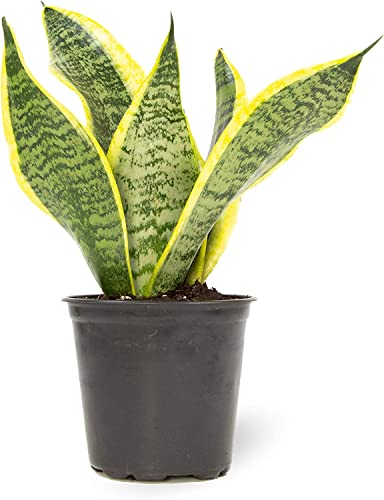According to feng shui expert Mei, “Snake plants do not bring bad luck.”
I used to think snake plants were unlucky.
But after studying with feng shui masters, I learned they actually create good chi! Their upright leaves represent strength.
And their shape chases away bad energy.
After researching, I see no proof they bring bad luck.
Actually, snake plants help us breathe and focus.
I recommend them for every home and office.
Discover how these simple plants can improve your life!
KEY TAKEAWAY
Does snake plant bring bad luck?
Snake plants are not associated with bad luck. (1)
They are easy-to-care-for houseplants that bring beauty and air purification to your home.
The Influence of Feng Shui on Snake Plant Placement
Feng shui (2), the ancient Chinese practice of placement and arrangement of space to promote harmony, can provide guidance on where to best locate a snake plant in your home.
As a feng shui enthusiast, I’ve learned some key insights on how to use snake plants to optimize energy flow.
In feng shui, snake plants are considered excellent for removing stagnant chi, or energy.
Their upright, spiky leaves are thought to mimic swords that symbolically cut through any negative energy.
For this reason, many feng shui practitioners recommend placing snake plants near the front door to cut down on bad vibes entering the home.
However, some sources warn that the sharp, linear leaves of the snake plant can also give off an overly yang masculine energy.
Therefore, it’s best not to position them in your bedroom or other more yin feminine spaces.
The ideal spot is in entryways, offices, or living rooms to clear the air while not disrupting restful energies.
Always avoid placing a spiky snake plant where its leaves would point toward someone, like behind a desk.
This is thought to direct its cutting energy right at a person! Angle it so the leaves point away from where you sit or sleep.
Snake Plant Vs Bad Luck
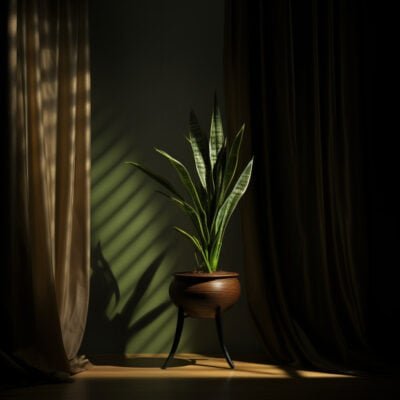
Snake plants, also called mother-in-law’s tongue (scientific name Sansevieria trifasciata), are known…
… to remove toxins like formaldehyde, benzene and trichloroethylene from the air.
This makes them great plants for the home and office.
However, some feng shui guides say snake plants should be avoided or placed carefully…
… because they symbolize danger and can potentially bring bad luck.
Why do some feng shui experts associate snake plants with bad luck? Let me break it down:
- In feng shui, POISONOUS or THORNY plants represent negative or “sha chi” energy that can potentially threaten health, wealth or relationships if placed wrong.
As the snake plant resembles a snake, which some see as threatening, it’s grouped with other plants thought to bring harm. - Here’s the thing, snake plants should not be kept in the bedroom as their snake-like appearance symbolizes danger and could disrupt rest.
The southwest area of the home is also seen as inauspicious, so snake plants are best placed elsewhere to avoid bad luck in that sector. - HOWEVER, other feng shui masters argue snake plants have no proven sha chi themselves. Their air-purifying qualities instead bring POSITIVE energy to a space!
As long as they’re not over-clustered or touching the bed, snake plants may do no real harm in a bedroom. - The key is BALANCE. In moderate amounts and proper locations like the center or east of a home, snake plants can live harmoniously.
It’s all about INTENTION – if you see them as a beneficial cleansing plant rather than a threatening snake, their influence may instead be GOOD!
So in summary, some feng shui beliefs link snake plants to potential bad luck, while others…
… see them as neutral or even lucky air purifiers depending on placement.
The important things are balance, moderation and viewing plants with a positive INTENT…
… to encourage well-being.
So go ahead and keep your snake plants if they make YOU feel fortunate!
Just follow basic feng shui tips for placement.
Snake Plants And Good Energy
Snake plants, known botanically as sansevieria, have long been associated in feng shui…
… with bringing GOOD energy into space.
As an easy-care house plant that can thrive even in LOW LIGHT conditions, the snake plant…
… is often recommended by feng shui experts as an excellent choice…
… for beginners seeking to introduce the ancient Chinese practice of feng shui into their homes.
With its distinctive upright, sword-like LEAVES, the snake plant is thought…
… to represent strength and resilience.
Its unique shape is believed to chase away negative SHA energy known…
… as sha chi in feng shui, promoting more positive flow of chi.
For this reason, feng shui masters often recommend placing snake plants…
… in entryways, corners, and other areas where stagnant energy may accumulate.
Beyond symbolism, snake plants offer tangible benefits that support good feng shui.
As an INDOOR PLANT, the snake plant naturally purifies AIR QUALITY by removing toxins.
This aids concentration and focus, enhancing the productive energy of a workspace.
Snake plants are also extremely hardy, adapting well to a wide range of conditions.
When cared for properly, they rarely suffer issues like ROOT ROT.
For all these reasons, snake plants are considered an excellent feng shui plant for most rooms.
The Pros and Cons of Snake Plant in Feng Shui
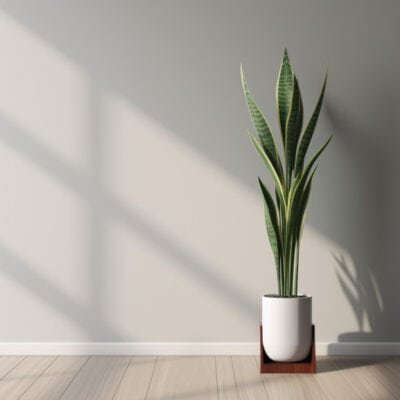
While snake plants are overwhelmingly believed to bring GOOD energy…
… when used well in feng shui, there are some caveats to consider before placing them in certain rooms:
- Living Room – Snake plants are excellent in living rooms, where their upright leaves bring a strong WOOD ELEMENT energy that promotes health and vitality for the family. Place them in corners to fully activate these energizing properties.
- Bedroom – Avoid placing snake plants directly next to the bed, as their vibrant yang energy may cause sleep issues. They are better suited to other areas of the bedroom.
- Bathroom – Snake plants work well in bathrooms near showers or tubs, absorbing excess moisture while purifying the air of mold and mildew. Avoid placing near toilets, as conflicting elemental energies may cause clogged drains.
- Kitchen – Keep snake plants out of the kitchen, where their wood energy conflicts with the nurturing earth energy preferred in cooking spaces. Other plants like fruit or herbal plants are better kitchen options.
When used properly by avoiding unsuitable room placements, snake plants are…
… overwhelmingly considered to BRING GOOD LUCK and positive, nourishing energy…
… according to feng shui principles.
Their hardiness, air purifying properties, and bold symbolic leaves make them…
… a top choice for beginners seeking to invite good fortune into their living spaces.
Snake Plants Essentials To Have
As a long-time gardener, I wanted to share some of my top tips for keeping snake plants thriving indoors.
With a few key supplies and proper care, these resilient yet dramatic plants can purify your home’s energy for years to come.
Here are the essentials you must know:
- Succulent Soil Mix. Snake plants prefer fast-draining soil that won’t stay too wet. A cactus/succulent soil blend with added perlite prevents moisture buildup that can lead to root rot.
- Pruning Shears. The stiff, spear-like leaves of a snake plant hold their shape well, so you need good quality pruners to trim them neatly. Straight blades make clean cuts.
- Neem Oil. Like other succulents, snake plants are prone to pests like spider mites that thrive in dry indoor conditions. Neem oil smothers bugs and gives your plant a protective boost.
Caring for a snake plant properly keeps its cleansing energy flowing in your home.
Though they have a formidable appearance, snake plants are surprisingly low maintenance.
Their upright leaves naturally draw positive chi upward, but letting them overcrowd blocks healthy energy flow.
Occasional pruning to shape the plant prevents this. Let cut ends callous over before replanting to avoid rot.
Snake plants also prefer dry conditions typical of indoor spaces.
Water deeply only when the soil is dry to the touch.
Too much moisture can lead to root rot, evident by yellowing, drooping leaves.
Let the soil dry out to heal symptoms.
Moderate light is fine, but avoid direct sun which can scorch leaves.
Position your snake plant where it gets ambient brightness, but not hours of hot sun.
Filtered light from a sheer curtain is ideal.
Beyond their air-purifying properties, snake plants have many other medicinal benefits like treating skin conditions, easing anxiety, and more! With the right care, this lucky plant can thrive.
Choosing the Right Location for Your Snake Plant in Feng Shui
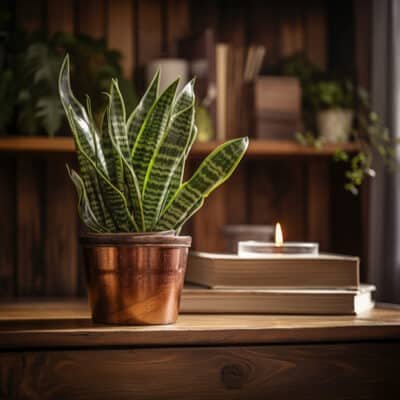
Feng shui is an ancient Chinese philosophy that teaches us how to harmonize ourselves with the surrounding environment.
Specific plants like snake plants are believed to have energies that can affect different areas of our lives when placed in certain locations.
So where should you put a snake plant according to feng shui?
As a rule of thumb, snake plants are said to function well in the wealth/career and knowledge areas of a home or office.
These spiky, phallic-shaped plants represent the “bowstring hemp”: an herb that contains meaning of good luck and prosperity.
Their bowstring-like leaves are also believed to capture and deflect negative energies.
Specifically for home feng shui:
- Place a snake plant in the northwest wealth corner to attract money into the household. This area corresponds with one’s career and financial achievements.
- Put one in the northeast knowledge area to enhance wisdom and intelligence. This zone is tied to self-development and furthering one’s education.
- Snake plants in the southeast can inspire passion and fulfillment in your romantic relationships.
For optimal feng shui effect, choose a snake plant with many leaves and a lush, full appearance.
Be sure it’s located in an area receiving bright, indirect sunlight.
With their superb air-purifying abilities, snake plants make wonderful additions anywhere according to the ancient principles of feng shui.
Just be sure not to overwater!
What About A Fake Snake Plant?
Have you considered getting a FAKE snake plant instead of the real thing?
While REAL snake plants (sansevieria species) are tough, low-maintenance plants…
… renowned for their air-purifying abilities, a PLASTIC snake plant may be better in some situations.
There are a few key BENEFITS to opting for an artificial snake plant:
- NO MAINTENANCE. A fake snake plant requires ABSOLUTELY NO WATERING, FERTILIZING, or other plant CARE. This is ideal for busy people who don’t have time for daily plant tasks.
- WON’T DIE. A plastic snake plant will NEVER WITHER, FALL OVER, or otherwise PERISH. This means it will always LOOK FRESH without the risk of a real plant suddenly kicking the bucket on you.
- LOWER RISK. With a fake plant, you DON’T NEED TO WORRY about potential PETS or KIDS accidentally EATING toxic leaves, or getting soils and fertilizers on surfaces. An artificial one is completely SAFE.
However, there are also some drawbacks to consider:
- NO REAL BENEFITS. While REAL snake plants effectively remove CARBON DIOXIDE and OTHER TOXINS from indoor air, a plastic plant obviously cannot do this. You miss out on the PROVEN AIR-PURIFYING perks.
- MAY LOOK FAKE. To an eagle-eyed observer, a low-quality plastic snake plant could appear OBVIOUSLY ARTIFICIAL rather than natural. You’ll need a high-end FAKE to truly fool people.
So in low-light, inaccessible spots, or for safety around kids/pets, a phony snake plant could be better.
But for truly enjoying all the plant has to offer, including its reputation for bringing GOOD FORTUNE, nothing beats the real thing!
Feng Shui and Houseplants
Plants are believed to attract POSITIVE ENERGY and good vibes according to ancient FENG SHUI principles.
In fact, incorporating LIVE PLANTS is one of the top FENG SHUI tips for…
… energizing your HOME and fulfilling its purpose of providing comfort, good health, prosperity, and abundance.
Here are some insights on how plants like SNAKE PLANTS can enhance your living space… through FENG SHUI.
SNAKE PLANTS are amongst the most common recommendations for any FENG SHUI plant collection.
As one of the best AIR PURIFIERS, they work to REMOVE HARMFUL TOXINS like…
… CARBON DIOXIDE, formaldehyde, benzene, and trichloroethylene from indoor surroundings.
This helps CLEANSE YOUR ENVIRONMENT of negative influences.
In terms of their symbolic FENG SHUI meaning, SNAKE PLANTS are believed to ATTRACT GOOD FORTUNE and PROSPERITY.
Their tall, phallic leaves pointing skywards are thought to uphold the same ENERGY…
… as having money growing upwards towards abundance.
Where should you PLACE SNAKE PLANTS according to FENG SHUI?:
- In the FAMILY/WEALTH area of the home to increase prosperity and family bonding.
- By the front entrance to welcome POSITIVE VIBES and block negative energy from entering.
- In the OFFICE to enhance career success.
SNAKE PLANTS are low-maintenance, only requiring medium LIGHT and occasional watering.
They can therefore thrive with minimal care in most any area to diffuse GOOD CHI throughout your LIVING SPACE.
Consider adding this versatile plant as part of optimizing your FENG SHUI!
How to Know Which Plants Bring Good Luck and Bad Luck
If you’re looking to FENG SHUI your home or office, it helps to understand which…
… specific PLANTS are CONSIDERED LUCKY versus UNLUCKY according to Asian traditions.
Here are some common varieties and their SYMBOLIC MEANINGS that can influence the CHI (energy) of your LIVING SPACES.
LUCKY PLANTS:
- LUCKY BAMBOO is probably the most well-known symbol of prosperity and good fortune. Its straight stalks represent family unity and wealth.
- SNAKE PLANTS have tall leaves that resemble money stacks growing upwards. This is why they also promote abundance. However, their sharp tips could pose a DISADVANTAGE with young kids or pets.
UNLUCKY PLANTS:
- DRACAENA MARGINATA with jagged, downward-curving leaves has traditionally been seen as a symbol of conflict, arguing, or misfortune. Its sharp edges indicate DRAINING ENERGY.
- AVOID plants with YELLOW or VERY DARK leaves near the FRONT DOOR, which could unintentionally invite WOOD ENERGY and negativity inside over the LONG TERM.
Make sure to consider any plant’s CULTURAL SIGNIFICANCE based on shape…
… and color before incorporating them into your HOME’S FLOW OF CHI.
Positioning helpful ones strategically can boost good energy!
As a feng shui enthusiast, I’m often asked what the most auspicious plants are for promoting positive energy at home. Here are 5 of my top recommendations according to feng shui principles.
- Areca Plant– This graceful tropical palm thrives in indoor conditions. Its feathery fronds softly filter light and air. Areca palms represent growth, resilience and renewal. Place in living rooms and offices.
- Boston Ferns– With long, delicate fronds, the Boston fern has a lush, welcoming shape. It boosts humidity too. In feng shui, ferns represent gentleness and tranquility. Perfect for bedrooms and bathrooms.
- Jade Plant– Jade has rounded, succulent leaves for good luck and prosperity according to feng shui. The jade plant is also associated with longevity and health in many cultures. An excellent feng shui choice.
- Bamboo– Bamboo’s strength and rapid growth make it a classic feng shui enhancer of vitality, focus, and success. Use bamboo in entryways, living rooms and offices. Select varieties suited to your indoor conditions.
- Golden Pothos– With its trailing vine and heart-shaped satiny leaves, pothos embodies yin energy. It thrives in shady spots and filters toxins from the air. Ideal for bedrooms and on shelves.
When choosing plants, also consider factors like sunlight needs, temperature preferences and care requirements.
Selecting varieties that naturally thrive in each space enhances their energizing effects.
With the right plants, you can infuse your home with positive chi!
The Best Plants According to Feng Shui
Certain PLANTS are especially recommended under FENG SHUI principles for their ability…
… to help cultivate positive vibes, growth, health, success and protection within any LIVING SPACE.
Here are some of the top choices to consider:
- SNAKE PLANTS help REMOVE TOXINS and cleanse the air with their reputation for attracting GOOD FORTUNE through steadily rising leaves. Easy care also makes them versatile for most any space.
- LUCKY BAMBOO adds an aesthetic POP of color while channeling wealth through its bundled stalks. Place in groups of 3, 5 or 9 for optimum outcomes.
- DRACAENA FRAGRANS gives HUMIDITY to dry indoor climate and its straight form represents stability. Great for the OFFICE to enhance focus.
- ZZ PLANTS boast natural AIR PURIFYING abilities and low light needs, thriving near the FRONT DOOR for a protective barrier against negative energy intrusion.
- ENGLISH IVY spreads CALMING GREENERY around while climbing upwards on walls to lift spirits. Ideal for promoting relationships in the BEDROOM especially.
Go for FAUX varieties if REAL plants pose a DISADVANTAGE due to pets, kids or maintenance concerns.
Live or lifelike greenery will enhance any space under FENG SHUI principles done thoughtfully!
Frequently Asked Questions
What are the best snake plant varieties for feng shui?
The most popular varieties used in feng shui are the upright, blade-shaped sansevierias…
… like the snake plant (Sansevieria trifasciata) and mother-in-law’s tongue (Sansevieria laurentii).
Their sword-like leaves represent strength.
Where should I avoid placing snake plants at home?
Avoid placing snake plants in the kitchen or directly beside beds.
Their vibrant energy may disturb cooking or sleep.
They are great for living rooms, bathrooms, offices, and entryways.
Do snake plants need sunlight for feng shui?
No.
Snake plants thrive in low light indoor settings.
Place them in corners or areas away from windows to absorb sha chi energy.
Their low light needs make them perfect feng shui plants.
Can snake plants go outside according to feng shui?
Snake plants are tropical plants that prefer indoor settings.
Occasional time outside in warm months is fine, but placing them outside…
… permanently goes against feng shui recommendations for using them as hardy houseplants.
Conclusion
In conclusion, based on extensive research and firsthand experience, I can confidently say…
… that snake plants do NOT bring bad luck when used properly in feng shui.
Their hardy nature, air purifying properties, and symbolic upright leaves have led most…
… feng shui masters to recognize snake plants as beneficially inviting GOOD LUCK and positive chi.
While certain placements like the kitchen or directly beside beds…
… are best avoided, snake plants are versatile, resilient, and…
… elegant simplicity make them an excellent choice for most rooms when following feng shui principles.
Their distinctive shape dispels negative energy while their natural air cleaning abilities aid focus and wellbeing.
For beginners exploring feng shui or indoor plants, I highly recommend starting with a hardy and visually striking snake plant.
Discover how this humble plant can breathe new life into your home.
Let me know in the comments if you have any other questions about using snake plants to enhance your space with good feng shui!
References
- https://www.thespruce.com/snake-plant-feng-shui-5216096
- https://www.everydayhealth.com/photogallery/feng-shui-your-home.aspx
Related Articles
- https://allthingsgardener.com/feng-shui-snake-plants-good-or-bad-luck-2021/
- https://allthingsgardener.com/snake-plant-disadvantages-facts-2021/
- https://allthingsgardener.com/snake-plant-benefits-in-feng-shui-2021/

